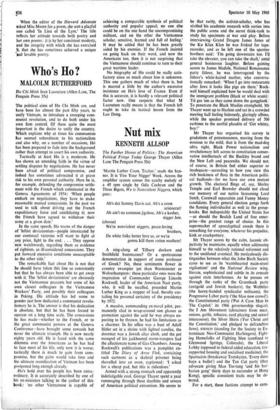Who's Ho?
MALCOLM RUTHERFORD
Ho CM Minh Jean Lacouture (Allen Lane, The Penguin Press 35s) The political aims of Ho Chi Minh are, and have been for almost the past fifty years, to unify Vietnam, to introduce a sweeping com- munist revolution, and to do both under his own firm control. Of these quite the most important is the desire to unify the country. Which explains why at times his communism has seemed subordinate to his nationalism and also why, on a number of occasions, HO has been prepared to fade into the background rather than attempt to assert his own authority.
Tactically at least Ho is a moderate. He has shown an unending faith in the virtue of settling disputes by negotiations. He has never been afraid of political compromise, and indeed has sometimes advocated it at grave risk to his own personal authority. Here he is, for example, defending the compromise settle- ment with the French which culminated in the Geneva Agreements of 1954: 'When people embark on negotiations, they have to make reasonable mutual concessions. In the past we used to talk about driving out the French expeditionary force and annihilating it; now the Wench have agreed to withdraw their army at a given date.'
In the same speech, Ho warns of the danger of 'leftist deviationism—people intoxicated by our continual victories will want to fight at ,any price, fight to the end. . . . They oppose new watchwords, regarding them as evidence 'of rightism, as ill-considered concessions. They put forward excessive conditions unacceptable to the other side.'
The remarkable fact about Ho is not that be should have taken this line so consistently but that he has always been able to get away with it. The 'leftist deviationists' are obviously not the Vietnamese peasants but some of his own closest colleagues in the Vietnamese Workers' Party, and possibly their colleagues in Peking. His attitude has led some to ponder just how dedicated a communist revolu- tionary he is. The answer is that his dedication is absolute, but that he has been forced to operate on a long time scale. The concessions he has made—whether to the French, or to the great communist powers at the Geneva Conference—have brought some rewards but never the ultimate triumph. Ho is now nearly eighty years old. He is faced with the same dilemma over the Americans as he has had to face most of his life, only now it is worse; tactically there is much to gain from com- promise, but the gains would take time and the ultimate reunification of Vietnam has been postponed long enough already.
,Ho's hold over his people has been extra- ordinary. It is accurately described by one of his ex-ministers talking to the author of this book: `no other Vietnamese is capable of achieving a comparable synthesis of political authority and popular appeal; no one else could be on the one hand the uncompromising militant, and on the other the Vietnamese scholar, sensitive, learned and full of feeling.' It may be added that he has been greatly aided by his enemies. If the French insisted on going back on their word, and now the Americans too, then it is not surprising that the Vietnamese should continue to turn to their great wartime leader.
No biography of Ho could be really satis- factory since so much about him is unknown. This one gathers much of what there is, but is marred a little by the author's excessive insistence on Ho's love of France. Even if this is accurate, it is hardly a relevant political factor now. One suspects that what M Lacouture really means is that the French left ought to take its tactical lesson from the Lao Dong.






































 Previous page
Previous page